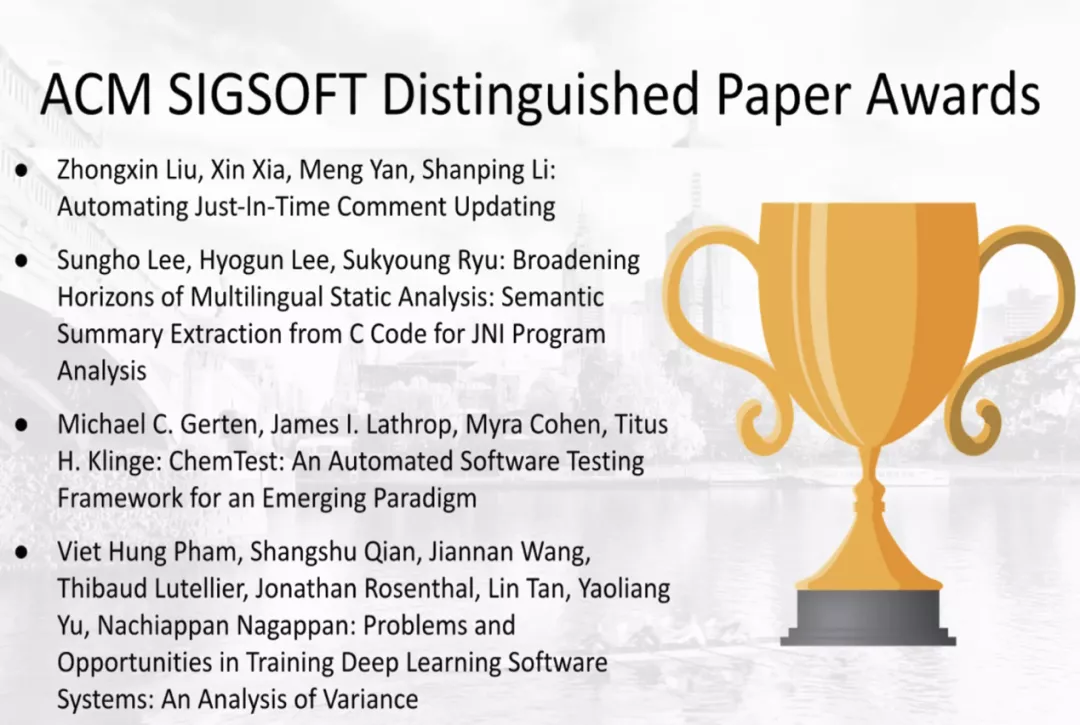ASE 2020 (The 35th IEEE/ACE International Conference on Automated Software Engineering, CCF A), the world’s top academic conference in the field of software engineering, was originally scheduled to be held in Melbourne, Australia from September 21 to 25. Affected by the COVID-19, it will be held online. The paper from the software engineering team of the College of Computer Science, Zhejiang University, Automating Just-In-Time Comment Updating, won the ACM SIGSOFT Outstanding Paper Award. The team has won the Outstanding Paper Award at the ASE Conference for three consecutive years.
ASE is recognized as the top international conference in the field of software engineering. Every year, many researchers from all over the world submit and participate in the conference. According to the organizer, ASE 2020 received a total of 414 paper submissions. After strict screening, 93 papers were accepted and 7 outstanding papers were selected. The software engineering team’s paper was successfully selected, and it was the only team in China that won the Outstanding Paper Award.

The software engineering team has achieved world-class research results in software analysis, software library mining, empirical software engineering, and AI testing and analysis. In the past five years, the team has published more than 40 papers in CCF A journals and conferences in the field of software engineering. In the past three years, it has won the Outstanding Paper Award of CCF A conference five times (ICSE 2018 and 2020, ASE 2018, 2019 and 2020).
The software engineering team has established an excellent software-related scientific research and development team based on 20 years of industry-university-research cooperation, and has achieved many international leading results. It has established efficient personnel training, scientific research cooperation and industry incubation mechanisms. The scientific research cooperation with Singapore Management University, Singapore University of Technology and Design, Monash University in Australia, UBC in Canada and other universities have achieved remarkable results. The industrial cooperation with State Street Corp, Hengtian Software, Bangsheng Technology, Hyperchain Technology, Harmony Cloud Technology and other enterprises have also achieved fruitful results, which made a greater impact on China’s software industry and the global open source community.
The first author of the award-winning paper is Zhongxin Liu, a PhD student in the software engineering team. Other authors include his supervisor, Professor Shanping Li from Zhejiang University, Professor Xin Xia from Monash University in Australia, and Researcher Meng Yan from Chongqing University. This is the third time after ASE 2018 and ASE 2019, Zhongxin Liu won the Outstanding Paper Award of ASE as the first author.
In ASE 2020, the software engineering team has a total of 4 long papers accepted. The following is a brief introduction of the related achievements:
Automating Just-In-Time Comment Updating
Authors: Zhongxin Liu, Xin Xia, Meng Yan, Shanping Li
In software system, the inconsistence of comments and code can mislead developers and introduce bugs. To cope with the problem, the paper proposes the task of Just-In-Time Comment Updating, which is to update the comments immediately with code changes, construct the first large-scale data set for the task, and propose Novel method based on sequence-to-sequence model to automatically update annotations instantly. The evaluation results show that the number of annotations correctly updated by this method is 7 times more than the base-performing baseline, which can reduce the number of edits used by developers for instant annotation updates.
API-Misuse Detection Driven by Fine-Grained API-Constraint Knowledge Graph
Authors: Xiaoxue Ren, Xinyuan Ye, Zhenchang Xing, Xin Xia, Xiwei Xu, Liming Zhu, Jianling Sun
The paper proposes a novel approach that detects API misuses directly against the API caveat knowledge, rather than API usage patterns. They develop open information extraction methods to construct a novel API-constraint knowledge graph from API reference documentation. This knowledge graph explicitly models two types of API-constraint relations (call-order and condition-checking) and enriches return and throw relations with return conditions and exception triggers. It empowers the detection of three types of frequent API misuses - missing calls, missing condition checking and missing exception handling, while existing detectors mostly focus on only missing calls. As a proof-of-concept, they apply the approach to Java SDK API Specification. The evaluation confirms the high accuracy of the extracted API-constraint relations.
Predicting Code Context Models for Software Development Tasks
Authors: Zhiyuan Wan, Gail Murphy, Xin Xia
Code context models consist of source code elements and their relations relevant to a task in a developer’s hand. In this paper, they explore the proactive formation of code context models based on the topological patterns of code elements from interaction histories for a project. Specifically, they first learn abstract topological patterns based on the stereotype roles of code elements, rather than on specific code elements; they then leverage the learned patterns to predict the code context models for a given task by graph pattern matching. To determine the effectiveness of this approach, they applied the approach to interaction histories stored for the Eclipse Mylyn open source project. The method predicts the performance index F-measure with an average of 0.57, which is 1.5 times more than Suede method.
Towards Interpreting Recurrent Neural Networks through Probabilistic Abstraction
Authors: Guoliang Dong, Jingyi Wang, Jun Sun, Yang Zhang, Xinyu Wang, Dai Ting, Jin Song Dong, Xingen Wang
In this work, they propose an approach to extract probabilistic automata for interpreting an important class of neural networks, i.e., recurrent neural networks. This method significantly improves the scalability of the existing model extraction algorithms, thereby providing a bridge for applying various software/system analysis techniques to neural networks in the real world.






